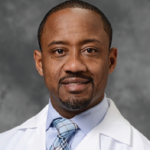One day, tired of seeing patient after patient with large head and neck cancers that could have been treated if caught early, otolaryngologist Charles Moore, MD, hopped into his car. He didn’t drive away from the overwhelming need he saw or the frustration he felt; instead, he headed to the neighborhoods that were home to the people he saw in his office every day.
Explore This Issue
October 2018“After saying to myself, over and over, ‘somebody needs to do something about this,’ I finally thought, maybe it should be me,” said Dr. Moore, chief of otolaryngology–head and neck surgery at Grady Hospital in Atlanta. “It was scary to do that, but I didn’t feel I could turn my back on it anymore.”
His first neighborhood expeditions were listening sessions. He talked with people at churches, community centers, homeless shelters, and on the street. “I didn’t tell them who I was, but people were very receptive to talking to me,” Dr. Moore said. “That’s how I learned.”
Soon, he was returning to the neighborhood on a regular basis, a one-man roving medical clinic operating out of the back of his car. What began simply as an effort to decrease suffering from head and neck cancer has since grown into the HEALing Community Center, a network of federally qualified health centers that provide primary and specialty healthcare to people in some of Atlanta’s most underserved neighborhoods.
Across the country, physicians with busy clinical practices and demanding academic careers are discovering the many benefits of community service. They’re using their medical skills, knowledge, and connections to improve public health and empower patients. They’re forging community connections, inspiring the next generation and finding a deep sense of personal satisfaction.
Here is how three otolaryngologists serve and strengthen their communities, and how you can make a difference in yours.
The students see someone who sat in the same classroom and learned some of the same things, and they see not only how I was able to apply that learning to get to where I am, but also how I use those concepts every day. —Lamont Jones, MD, MBA
The Community Ambassador: Dr. Lamont Jones
 Before Lamont Jones, MD, MBA, was vice chair of otolaryngology at the Henry Ford Health System and an internationally respected keloid researcher, he was a public-school student in Detroit. He was considering a career in bioengineering when one of his high school teachers suggested medical school. “Growing up in Detroit, I didn’t have any examples of African-American doctors. But I was always taught that I could do whatever I wanted to do, and I worked at it and was given the opportunity,” Dr. Jones said.
Before Lamont Jones, MD, MBA, was vice chair of otolaryngology at the Henry Ford Health System and an internationally respected keloid researcher, he was a public-school student in Detroit. He was considering a career in bioengineering when one of his high school teachers suggested medical school. “Growing up in Detroit, I didn’t have any examples of African-American doctors. But I was always taught that I could do whatever I wanted to do, and I worked at it and was given the opportunity,” Dr. Jones said.